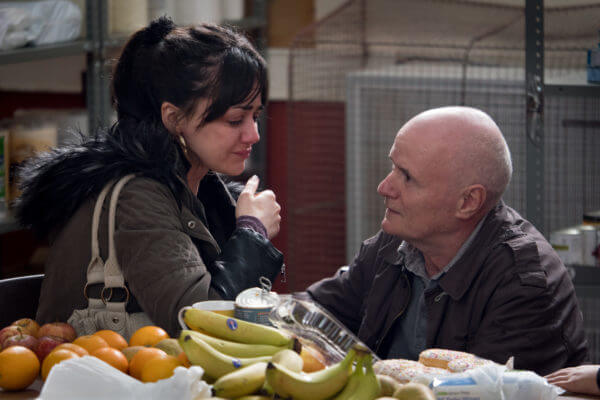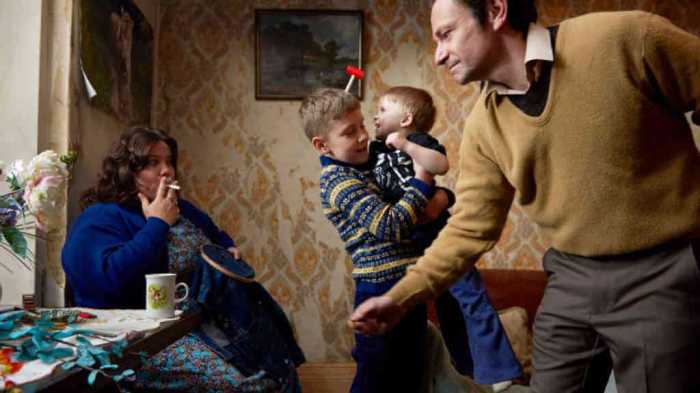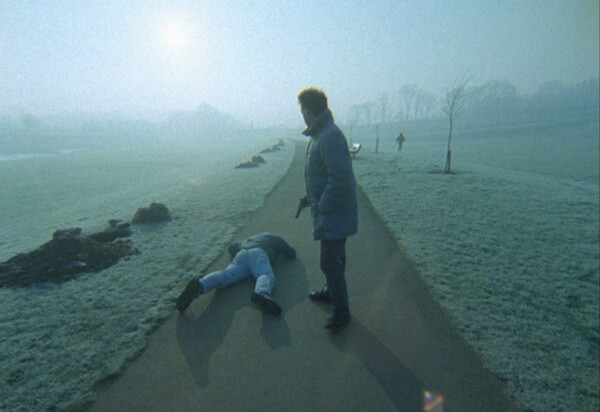Dave Johns and Hayley Squires in Ken Loach’s “I, Daniel Blake.” | JOSS BARRATT/ SUNDANCE SELECTS
What a difference two months makes! When I first saw British director’s “I, Daniel Blake” in early October at the New York Film Festival, I found its tale of an unemployed man’s struggle extremely moving but a bit heavy-handed. After the election, that excess now seems like righteous, well-placed anger.
The title character (Dave Johns) tries to navigate the dregs of the British welfare state with the few tools he has, including a pencil, a spray can, and an extremely weak body. (He’s just suffered a massive heart attack.) It’s a shock to watch the film and realize that working-class people having the right to health care without worrying about how they’ll pay for insurance is taken for granted in other societies. Loach depicts England as a dysfunctional welfare state; the resonance for a Trump-governed America is clear, as we wait to see if Obamacare and Medicare will be stripped away from us.
At the start of the film, Daniel Blake wants to go back to work, but his doctor advises him to rest. He enters the British welfare system, with its dizzying array of systems designed to help people at varying levels of ability, but he quickly discovers that it’s really intended to discourage people. A man who’s never owned a computer, he now finds himself dependent on strangers to fill out forms online. At one office, he makes friends with Katey (Hayley Squires), a single mother with two children. She soon becomes a part of his life, but she’s even more desperate. After breaking down at a food bank and then getting caught shoplifting, she turns to sex work.
With “I, Daniel Blake,” Ken Loach captures the anger, despair rife in Western democracies
The past few Loach films were not bad, but they played like socialist variations on “Footloose” or “The Full Monty.” With “I, Daniel Blake,” he and screenwriter Paul Laverty have got their anger back. To be sure, there are places where Daniel’s struggles become unbelievable. He’s computer-illiterate to a degree that doesn’t ring true for anyone living in a modern urban society. I’d think that even 60-year-olds would know that you don’t turn in a handwritten résumé if you want potential employers to take you seriously. Similarly, Daniel needs someone to tell him that you don’t literally touch the monitor with a mouse.
However, Johns, a stand-up comic in real life, does a terrific job of channeling the rage of Laverty’s screenplay. He starts at a high point of aggression and only gets more and more pissed-off at his treatment from there. Squires is a worthy foil. Almost everything we learn about Daniel relates to his job search, apart from his memories of his late wife. It becomes clear that the humiliation built into the system is a defining feature; it’s not some unintended bug. It’s no wonder that everyone around Daniel is turning to crime. One of his neighbors imports knock-off sneakers from China and sells them at a discount. Katey may be humiliated when Daniel discovers that she works as an escort, but she points out that she’s got 300 pounds in her pocket. Meanwhile, he goes on to sell off most of his furniture.
There’s a danger that some people, particularly in the current American climate, will take “I, Daniel Blake” as a conservative attack on big government and the welfare state. The film certainly shows how they can grind people down when they become oppressive. I wouldn’t bring this up if I hadn’t read a tweet interpreting the film precisely this way. A Marxist since the ‘60s, Loach isn’t arguing against big government –– he wants bureaucracy that exists to serve people, not alienate them. Whether such a functional UK has existed in his adult life is not a question I’m qualified to answer.
The UK depicted by Loach pretends to serve people. It’s at least theoretically starting from a higher place than the current US government and culture, even in this film devoted to showing its flaws. An American remake would be even grimmer, a post-Trump remake probably even grimmer still. All of a sudden, the improbability of Daniel’s ineptness with computers doesn’t seem to matter very much.
I, DANIEL BLAKE | Directed by Ken Loach | Sundance Selects | Opens Dec. 23 | IFC Center, 323 Sixth Ave. at W. Third St.; ifccenter.com | Lincoln Plaza Cinema, 1886 Broadway at W. 62nd St.; lincolnplazacinema.com




































